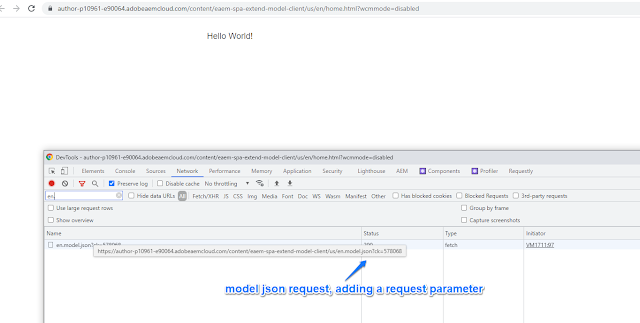Goal
Extend the React SPA ModelManager to pass request parameters like Access tokens, Cache killer...
Solution
1) Create the maven project for your AEM React SPA...
mvn -B archetype:generate -D archetypeGroupId=com.adobe.aem -D archetypeArtifactId=aem-project-archetype -D archetypeVersion=30
-D aemVersion=cloud -D appTitle="Experience AEM Extend Model Client" -D appId="eaem-spa-extend-model-client"
-D groupId="apps.experienceaem.sites" -D frontendModule=react -D includeExamples=n -D includeDispatcherConfig=n
2) Add logic for extending the ModelClient in file ui.frontend\src\utils\extend-model-client.tsx
import { ModelClient } from "@adobe/aem-spa-page-model-manager";
export const extendModelClient = () => {
const client = new ModelClient();
const extend = (modelClient:any) => {
const fetch = modelClient.fetch as Function;
modelClient.fetch = async function (modelPath:string):Promise<object> {
try {
const jsonData = await fetch.call(this, modelPath + "?ck=" + Math.floor(Math.random() * 999999));
return Promise.resolve(jsonData);
} catch (err) {
return Promise.reject(err);
}
};
return modelClient;
};
const modelClient:ModelClient = extend(client);
return modelClient;
}
export default extendModelClient;
3) While initializing the ModelManager pass the extended version of ModelClient eg. #4 in following ui.frontend\src\index.js
import extendModelClient from './utils/extend-model-client';
const renderApp = () => {
ModelManager.initialize({ modelClient : extendModelClient()}).then(pageModel => {
const history = createBrowserHistory();
render(
<Router history={history}>
<App
history={history}
cqChildren={pageModel[Constants.CHILDREN_PROP]}
cqItems={pageModel[Constants.ITEMS_PROP]}
cqItemsOrder={pageModel[Constants.ITEMS_ORDER_PROP]}
cqPath={pageModel[Constants.PATH_PROP]}
locationPathname={window.location.pathname}
/>
</Router>,
document.getElementById('spa-root')
);
});
};
